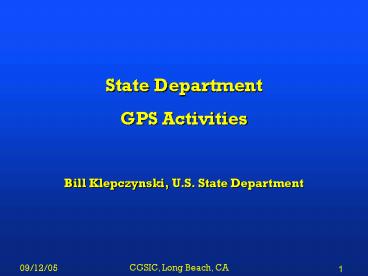State Department GPS Activities - PowerPoint PPT Presentation
1 / 16
Title:
State Department GPS Activities
Description:
Promote international cooperation in using GPS for peaceful purposes ... Cooperation agreements address national security, economic, and technical issues ... – PowerPoint PPT presentation
Number of Views:46
Avg rating:3.0/5.0
Title: State Department GPS Activities
1
State DepartmentGPS Activities
- Bill Klepczynski, U.S. State Department
2
Thanks to Chris Hegarty of Mitre for help with
some of the slides
3
US Policy
- Consistent national policy statements from
Executive and Legislative Branches - Congressional guidance, 1983
- Presidential Decision Directive, March 28, 1996
- U.S. Public Law, December 1998
- U.S. Space-based Positioning, Navigation and
Timing Policy, December 15, 2004 - Civil GPS signals to be provided free of direct
user charges (since 1983) - Selective Availability ended on May 2000 with no
intent to turn back on - Promote common standards for worldwide
interoperability
4
US GPS Policy, contd.
- Promote acceptance and use of GPS
- Encourage acceptance of GPS into peaceful civil,
commercial and scientific applications - Promote international cooperation in using GPS
for peaceful purposes - Promote safety and efficiency in transportation
- Encourage private investment in GPS
- Strengthen and maintain national security
5
Compatibility and Interoperability
- Compatibility
- not cause degradation for users, i.e., one system
will not cause interference to the other system - Interoperability
- provide improved performance compared to stand
alone system, i.e., user gets solutions that are
better than can be achieved by either system
alone - Goal Seamless worldwide service for all civil
and commercial users
6
GPS signals
7
U.S.-European Cooperation
- U.S. and E.C. have been working towards a
mutually acceptable framework agreement on
cooperation - Recognize benefits for civil users if systems are
compatible and interoperable - Wants cooperation to lead to best GNSS system of
systems - Europe benefits from cooperation
- Lessons learned from U.S. experience
- Could reduce cost and schedule risk
8
June 2004 U.S.-European Community Agreement
- Signed on June 26, 2004 in Dublin
- Key provisions
- Baseline GALILEO L1 signals that both sides agree
are interoperable and compatible with GPS - Compatibility includes both radio frequency and
national security aspects - Number of articles to promote open markets and
fair trade - Agreement to establish four follow-on working
groups - A Compatibility/interoperability
- B Trade
- C Cooperation on next-generation satnav
- D National security
9
Working Group Status
- WGA (Compatibility/Interoperability)
- March 2005 Brussels
- Focus on terms of reference and work program
- L1F/L1C signal optimization
- GPS-GALILEO time offset (GGTO) and reference
frames - L5/E5a compatibility
- June 2005 Los Angeles
- Further discussion on same topics as 1st meeting
- EU L1F optimized signal
- October 2005 Fucino
- Remaining WGs no meeting dates established
- Working Group B (Trade) U.S. prep meeting
recently held - Working Group C (Next Generation) U.S. prep
meeting recently held - Working Group D (National Security) U.S. prep
meeting recently held maybe November 2005
10
GPS and Galileo Signal Spectra
C/A
(CS, SoL)
CS
(OS)
PRS
OS/GPS III
PRS
L5
E5b
E5a
M
P(Y)
L1 (1575.42 MHz)
E6 (1278.75 MHz)
L2 (1227.6 MHz)
L5 (1176.45 MHz)
E5 (1207.14 MHz)
BOC(15,10) modulation option shown for E5a/E5b.
Prepared by Chris Hegarty, MITRE
11
GPS-GLONASS Activities
- Signed on December 10, 2004 in Washington, DC
- Key provisions agreed to by both sides
- Maintain interoperability and compatibility of
GPS and GLONASS - Cooperate on matters of mutual interest related
to PNT signals and systems, value added services,
and global navigation and timing goods in
relevant international organizations and fora - Will continue to provide GPS and GLONASS civil
signals on a continuous, worldwide basis, free of
direct user fees - Agreement to establish two follow-on working
groups - 1 Compatibility/interoperability
- 2 COSPAS-SARSAT
12
GPS-GLONASS Working Group Status
- WG1 (Compatibility Interoperability) Col.
Mark Crews - October 2005 Moscow
- WG2 (COSPAS-SARSAT) Ajay Mehta
- June 2004 London
- November 2005 - Montreal
13
GNSS Frequency Bands
RNSS Radio Navigation Satellite Service ARNS
Aeronautical Radio Navigation Service
G1
(E5aE5b)
E6
(E2L1E1)
14
U.S.-Japan Cooperation GPS and QZSS
- Based on 1998 Joint Statement
- Common standards
- Systems use GPS L1, L2, and L5
- QZSS will improve performance in urban canyons
and mountains - U.S. and Japan have been conducting scheduled
technical working groups to ensure
interoperability - Plenary Meeting held November 2004
15
Brazil
- U.S. Delegation visited Brazil in October 2003 to
discuss use of GPS, further collaboration on
application research, and the potential for a
cooperation agreement - Three days spent in Brasilia meeting with various
ministries representatives - Two days in Sao Paulo meeting with US Counselor,
American Chamber of Commerce, and industry
representatives - US-Brazil GPS conference held in September 2004
in Sao Paulo
16
General Summary
- Cooperation agreements address national security,
economic, and technical issues - Protect compatibility
- Encourages civil interoperability
- Provide service to civil users on a continuous,
worldwide basis, free of direct user fees

